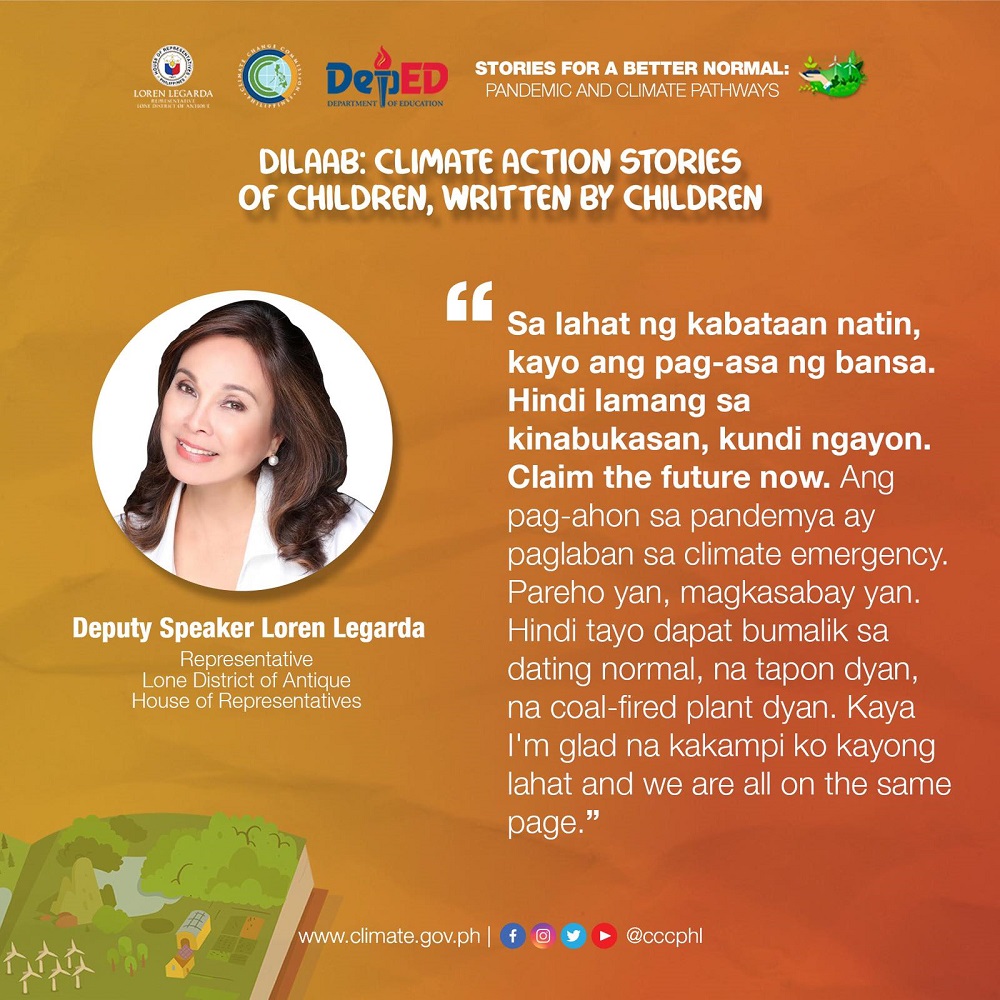
August 15, 2021 Sunday

MANILA, 16 August 2021 — The 57th episode of “Stories for a Better Normal: Pandemic and Climate Change Pathways” featured the Department of Education (DepEd) learners and personnel that showcased inspiring stories on advocating climate action. The episode is in time for the celebration of International Youth Day last August 12.
The online conversation, conceptualized and hosted by three-term Senator, now Deputy Speaker and Antique Representative Loren Legarda, featured guests including Director Ronilda Co and Ms. Zherluck Shaen Rodriguez of the DepEd Disaster Risk Reduction and Management Service (DRRMS); Joshua Villalobos of the Youth for Climate Hope (Division of Bacolod City), Ckyr Leonardo from Valencia National High School (Division of Valencia City), Raaina Hinay of Kids Who Farm (Division of Zamboanga City); and Amabelle Franchesca Boncato, a campus journalist from Congressional Integrated High School (Division of Cavite).
Director Co and Ms. Rodriguez introduced the “Stories of Children, Written by Children,” a booklet developed by DepEd DRRMS that features learners who exemplified outstanding leadership in environmental initiatives related to CCAM-DRR in their schools and communities.
“Children and youth are our present and future. Ang mga kabataan ang pag-asa ng bayan. Ngunit hindi lang sila pag-asa ng kinabukasan, kundi sa kasalukuyan din. That’s why we have to engage them in meaningful activities. Ang ginagawa ng DRRMS ay hindi na lamang consultations sa mga kabataan, iniaangat din natin ang participation doon sa level ng co-collaboration sa mga bata. We hope that we are able to support the youth, our learners into leading programs. We are going in that direction,” said Director Co.
“We want to make sure na ang ating mga kabataan ay napapakinggan, kasi hindi lang sila mga bata. This is why in DepEd, we listen, support, empower, and enable them. We make sure that we listen to their voices and support their existing programs, rojects, and activities. We also want to empower our learners and create an enebling system na pwede silang magparticipate sa ating mga programa,” said Rodriguez.
Villalobos introduced the “Youth for Climate Hope”, a coalition of youth organizations and individuals in Negros Occidental that engages the students in climate action, policy lobbying, creative mass action, and a culture and community that cares for the people and the environment. Their advocacies include the petition to amend the plastic bag regulation in Bacolod and campaign against plans on coal-fired power plant projects in the Negros region.
“Hindi naman po ibig sabihin na nag-climate strike tayo ay masasama na tayong mga kabataan, but it is a manifestation na naintindihan natin kung ano ‘yung ibig sabihin ng climate science. Nagra-rally tayo behind sa kung ano ang panawagan ng mga scientists at ng maraming sector na kailangan na natin ng justice at rapid reduction of our greenhouse gases emissions, para hindi natin maabot ang mga threshold na unti-unti na nating naaabot,” said Villalobos.
Leonardo introduced his “One Man, One Tree” program which promotes that each individual must plant at least one tree to regenerate forests severely deforested due to illegal activities.
“Plant a tree today and enjoy reaping the fruits of a greener world in the future. It inspires me to continue doing my advocacy, kasi gusto ko po ‘yung future generation ay maka-experience rin ng greener world at makalanghap ng sariwang hangin,” said Leonardo.
Hinay introduced “Kids Who Farm,” an initiative that aims to empower the youth and children as the next generation of food producers by making farming fun, easy to do, and sustainable. This program trains youth and women on urban container gardening, and established food community gardens in schools and micro-farm projects, and provides fresh and hyperlocal food access to local residents, especially in this time of the pandemic.
“Our vision is to reverse the persistent trend of aging Filipino farmers by building the expertise of the youth in agriculture and creating urban green jobs incubation opportunities to engage them in the business of farming to secure food for the future. Our goal is to inspire future farmers. As young as we are, we can be a source of inspiration to our fellow young people,” said Hinay.
Boncato, one of the student journalists who completed "The Green Beat Initiative,” an online environmental journalism training spearheaded by the DepEd DRRMS, is one of the writers of the said booklet.
“At this age, I am already experiencing the consequences of climate change through consecutive typhoons and extreme droughts. I know that many environmental problems and concerns need so much attention from the media, and they’re the ones who are capable of putting those in the spotlight… I believe that one of the reasons why I am here doing environmental journalism is to amplify the voices of those unheard and to be the voice of our dear Mother Earth,” said Boncato.
Legarda emphasized the need to further raise awareness on the current climate emergency and to share knowledge on how the children, youth, and the general public can contribute to climate action.
“Ngayong International Youth Day, sa lahat ng kabataan natin, kayo ang pag-asa ng bansa, hindi lamang sa kinabukasan, kundi sa ngayon. Claim the future now. Ang pag-ahon sa pandemya ay paglaban sa climate emergency. Pareho ‘yan, magkasabay ‘yan, hindi tayo dapat bumalik sa dating normal. Kaya I'm glad na kakampi ko kayong lahat and we are all on the same page," said Legarda.
As an online discussion to promote health, environmental consciousness, and climate-adaptive practices, "Stories for a Better Normal" aims to change the mindset of individuals, families, and communities by demonstrating ways in which a ‘better normal’ can be realized within our communities.
This online discussion is organized in partnership between the Office of Deputy Speaker Legarda and the Climate Change Commission, with support from the Department of Education, Philippine Information Agency, Institute for Climate and Sustainable Cities, The Climate Reality Project-Philippines and Mother Earth Foundation.